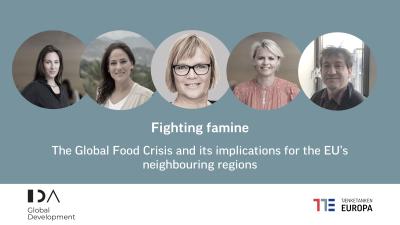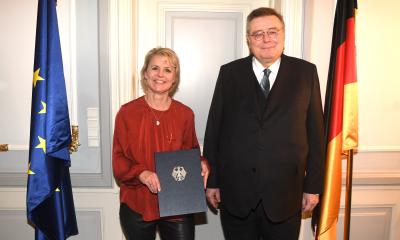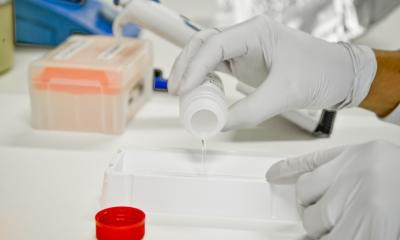High-Level Insights: Fighting Famine
On November 9th, 2022, Think Tank EUROPA in collaboration with IDA Development hosted a webinar on the current food crisis. This note presents high-level insights from the webinar.


In the webinar Virginia Villar Arribas, Deputy Director, Private Partnerships at the World Food Programme, Birgitte Qvist-Sørensen, General Secretary at the DanChurch Aid and Fabien Santini, Deputy Head of Unit, DG AGRI, Governance of the agri-food markets, European Commission, shared their views on the scale and severity of the crisis as well as current challenges related to the global food system, which must be overcome to combat hunger.
STATE OF PLAY: AN UNPRECEDENTED FOOD CRISIS
The current food crisis is the most severe crisis documented in recent history. We are witnessing the reversal of decades of development on poverty reduction, food security, and hunger. Since the outbreak of COVID-19 the number of people affected by hunger has increased by 150 million people.
STAGES OF FOOD INSECURITY
1. Food security: People have access to enough nutritious food without major changes to their daily lives at all times.
2. Food insecurity: People are eating minimally adequate diets but must make significant changes to support non-food needs.
3. Acute food insecurity: Some people are not consuming enough food and have high levels of malnutrition, others are using up essential resources to support a limited diet.
4. Humanitarian emergency: People face extreme food shortages. Acute malnutrition and disease levels are high. Risk of hunger-related death is rapidly increasing. This is the final warning for action.
5. Famine: Complete lack of food access and other basic needs. Every day at least two out of every 10,000 people die of starvation or disease – often mothers, the elderly and young children.
Source: World Food Programme
828 million people go to bed hungry every night, whereof 345 million people across 82 countries face acute food insecurity. This food crisis is affecting in particular North Africa, the Horn of Africa and the Middle East, where Pakistan and Afghanistan are crisis hotspots. Regions dependent on Russian and Ukrainian grain exports are also noticeably affected.
Four factors driving the crisis:
- Conflict: Conflict is one of the main drivers of food insecurity. Last year, more than 70% of people affected by acute food insecurity lived in conflict zones. Russia’s invasion of Ukraine is currently amplifying the crisis by forcing a surge in energy, food and fertilizer prices.
- Climate: Floods, drought, storms and erosion of land have a clear impact on the crisis, deteriorating both the production, security, transportation, supply chains, and economic prosperity of food.
- Cost: As a result of the inflation and energy crisis, global food prices have reached an all-time high, closely followed by domestic food and fertilizer prices.
- Covid-19: The covid pandemic triggered a backlash by disrupting economic activity, causing massive income losses.
Communities are consequently hit by ongoing setbacks from COVID-19, weather-related disasters fuelled by climate change and prolonged conflicts.
LOOKING AHEAD: DIVERSIFICATION AND COOPERATION
Broadening our conception of food chains: We currently rely on a too narrow conception of the stakeholders involved in global food chains, as there is a lack of information and poor overview of the current complex food industry. We need to develop a holistic view of the world’s food chains that enables us to shape and implement appropriate legislation. This will allow us to improve our future policies and increase communication between the diverse set of actors involved in global food chains, from machine reproducers, farmers, transporters and packagers to consumers, food banks, stakeholders, private actors and regulators.
Knowledge-sharing: Famine is driven by an array of factors, and we must specifically address the different causes of a food crisis in order to provide the needed solutions. To do so, we must combine the knowledge of governments, science and NGO’s. At the same time, we cannot rely solely on top-down solutions. Change must come from below by private actors contributing with local knowledge, which together with experts and consumers will produce innovation that is central in solving the food crisis.
Diversification & localisation: Today the food industry is highly concentrated with 11 countries controlling key staples, with only 3 countries holding the entire world’s wheat reserves and 4 companies exporting the wheat. If current food chains are disrupted, we will face a disproportionate and severe blow – the war in Ukraine serving as a current reminder. Making the industry more resilient against future shocks requires diversifying and localising food production. This is achieved by supporting governments with long-term planning, giving farmers access to markets and making crops profitable through investments in new supply chains.
Monitoring the speculation of food markets: Concerns were raised over the growing speculation in food markets and prices. Yet, there is vast disagreement as to what extent speculation actually disrupts global food prices, and with regards to how we monitor speculation properly and simultaneously avoid driving out investors who are vital for entrepreneurial farmers and new businesses.
Biosolutions 2030 – Towards a paradigm shift in European agricultural and food policy. Financed by Novo Nordisk Foundation (NNF22SA0080353)
Tænketanken EUROPA indtager ikke holdninger som organisation. Denne tekst repræsenterer alene – som alle udgivelser fra Tænketanken EUROPA – forfatterens/forfatternes betragtninger.








